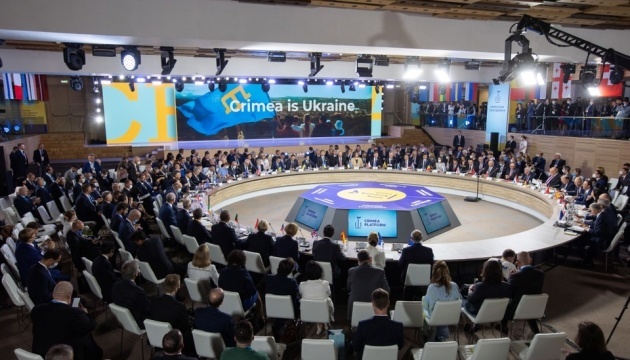
Crimea Platform participants adopt joint declaration
The participants in the International Crimea Platform reaffirmed their support for Ukraine's territorial integrity, condemned the temporary occupation of Crimea, the militarization of the peninsula, human rights violations and restrictions on freedom of navigation in the region, and called on the Russian Federation to engage constructively in the Platform activities.
“Participants in the International Crimea Platform do not recognize and continue to condemn the temporary occupation and illegal annexation of Crimea, which constitutes a direct challenge to international security with grave implications for the international legal order that protects the territorial integrity, unity and sovereignty of all States,” reads the Joint Declaration of the International Crimea Platform Participants released on the website of the Ministry of Foreign Affairs of Ukraine.
The Participants reaffirmed commitment to the sovereignty, political independence, unity and territorial integrity of Ukraine within its internationally recognized borders, extending to its territorial waters.
The Declaration condemns the continued violations and abuses and systematic undue restrictions of human rights and fundamental freedoms that residents of Crimea face, the ongoing militarization of Crimea that undermines security and stability in the wider Black Sea region, impediments to navigational rights and freedoms.
The Declaration establishes the International Crimea Platform as a consultative and coordination format with the aim of peacefully ending the Russian Federation’s temporary occupation of the Autonomous Republic of Crimea and the city of Sevastopol and to restore control of Ukraine over this territory in full accordance with international law,
The Participants also decided to consider further political, diplomatic and restrictive measures towards the Russian Federation, if provided for by the legal jurisdiction of each Participant and in line with respective procedures, when appropriate and should Russia’s actions so require.
Moreover, it is noted that the Participants will address emerging challenges and evolving hybrid threats resulting from the ongoing militarization of Crimea and support joint efforts to strengthen resilience to those threats in the context of growing threats to security and stability in the Black Sea region.
The Russian Federation is urged to comply with its obligations as an occupying power under international humanitarian law and other applicable international law, to bring an immediate end to all violations and abuses of human rights of residents of Crimea and to provide full and unimpeded access to Crimea for established regional and international monitoring mechanisms, in particular the UN Human Rights Monitoring Mission in Ukraine and the OSCE Special Monitoring Mission to Ukraine, as well as for human rights non-governmental organizations.
The Participants decided to unite efforts aimed at protecting the rights and freedoms of the civilian population living in the occupied Crimea and achieving the immediate and unconditional release of Ukrainian citizens unlawfully detained or convicted for political reasons by Russia and its state agents, both in the territory of the occupied Crimea and in the territory of the Russian Federation.
In addition, the Declaration stipulates that the Participants will consider supporting economic, infrastructure and environmental projects that would contribute to the further development of Ukraine’s regions adjacent to the temporarily occupied Crimean peninsula.
The Participants in the International Crimea Platform reiterated their commitment to maintaining pressure on Russia to end the temporary occupation by Russia of the Autonomous Republic of Crimea and the city of Sevastopol and to restore Ukraine’s control over the territory.
As reported, the inaugural summit of the Crimea Platform – President’s initiative for the de-occupation of Crimea – is held in Kyiv on August 23. Forty-six delegations take part in the summit.
ol
